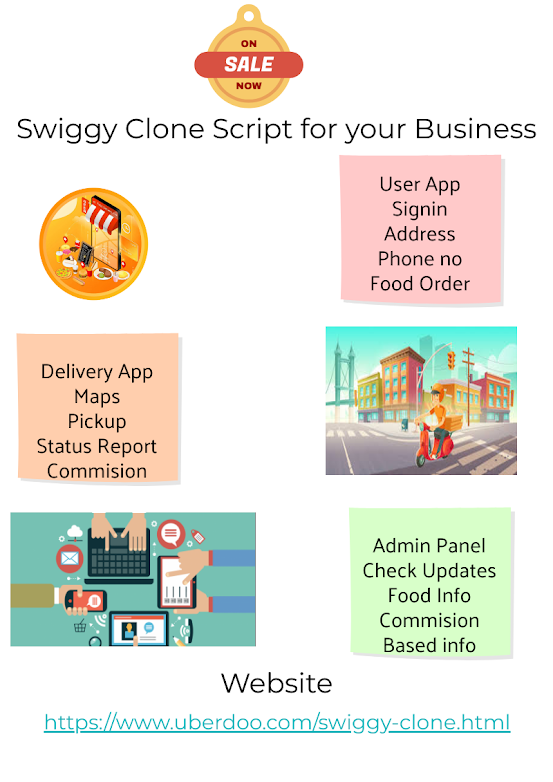Food delivery apps are seeing a rise in prominence and this trend will continue forever if the app
satiates the hungry customers by providing Ease of Convenience. This implies that people can order
their food from their homes' safety and comfort in light of the pandemic that has ravaged the entire
world. If you want to develop your own special Swiggy clone solution based on the order and
delivery model, then you have to give great importance to 4 parts namely the customer app, the
restaurant app, the admin app and what is called as the driver panel. This article will throw light on
the integral features of each component that completely forms a food ordering/delivery app
solution.
(i) User Panel
Registration & map; Profile Management:
This is the first page that customers see in the app. Users can sign up with their email ids or mobile
numbers. But that is an old tradition; now they can sign up with their social media credentials that
include Facebook, Instagram and Twitter. The advantage is that everything gets synced with the
Deliveroo clone solution from the original social media account. In other words, the profile gets
created automatically when registering via social media accounts.
Geo-location:
This is to allow the user base to track the real-time location of the delivery personnel and the
location of the eateries as well.
A multitude of Delivery Addresses:
Should the user be away from their home address, they can use this feature to get their present
location identified and get the delivery done to the same.
Payment Mode:
To encourage the practice of zero-contact delivery, the app must be integrated with several digital
payment options that include eWallets, Credit/Debit card payment and Reward Points. This type of
payment must be instantaneous and extremely safe from hacking and security breaches.
Push Notifications:
With this functionality, the business can share information related to the offers, coupons and the
timely discounts on the user screens via push notifications. This will serve greatly in optimizing
customer retention and will lead to more orders being generated.
(ii) Admin Panel
One-click Dashboard:
This dashboard is nothing but an all-encompassing centralized system making use. The Admin can
seamlessly manage the back-end operations, including tracking orders from customers, taking care
of inventory updates and lots more.
Order Management:
This is to help the managers in assigning orders as soon as a request is received. The admin can
monitor everything related to the order and implement the best decisions aimed to optimize the
business.
Manage Restaurants:
With this feature, the admin can add or remove an eatery from the app.
Feedback Management:
Here, the Admin can check all the reviews, ratings and feedback related to the customers.
Reporting and Analytics – With real-time analytics, the Admin can get considerable insight to
streamline the business and develop plans to optimize both the business services and the user
experience.
(iii) Restaurant Panel Features
Restaurant Profile:
The eatery based owners can add and update everything related to their food listings and prices. It is
also used to make the food items available for ordering concerning the given availability.
Accounts & Management:
With the help of the admin app, the eateries must be able to take care of the payments and the
financial accounts.
Dashboard:
This contains a wealth of information related to the new order status, the orders that were cancelled
and completed, and the orders prepared.
Accepting / Rejecting orders:
Here the restaurant owners can be able to accept or reject order requests.
Order Reports:
The eatery/restaurant owners will be able to obtain real-time data related to the business's
performance so that the correct actions can be implemented accordingly.
Customer Support:
This feature is used by the Store Manager to effectively sort out problems and issues related to the
orders or the restaurant.
(iv) Delivery Personnel Panel
Order Assignment:
Here the delivery personnel will be assigned order requests automatically from eateries in the
vicinity. It is then their decision to accept or reject them.
Delivery History:
Thanks to this feature, the delivery personnel will be able to track both the deliveries and the related
payment.
Call/Chat Feature:
Should any issue arise when finding the customer address, the delivery personnel will contact the
customer via chat or a call. This is also used to allow the delivery personnel to interact with the app
support team.
Status Update:
With the help of this feature, the delivery personnel will be able to update the delivery status.
Conclusion:
That summed up the important features that should be a part of a successful food ordering/ delivery
mobile application solution. If you need to develop your very own successful food delivery business
in the midst of the pandemic, you are welcome to try out the feature-rich Swiggy Clone Script
developed by the team at Uberdoo. It consists of many features that ensure that the health of the
customer and the driver are of the top priority in these grim times. Our Swiggy clone apps have
played a big role in uplifting the food delivery businesses of our clients
Visit Uberdoo.com to know more.

Comments
Post a Comment